Jonathan-David Jackson's Blog, page 3
October 9, 2014
Homework: A Failure of Society
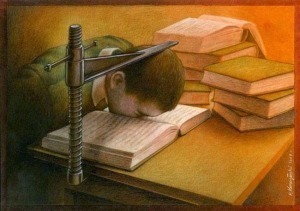
(Artist: Pawel Kuczynski)
I have some pretty non-traditional views of schooling. From the time I was 5 to the time I was 14, I went to a school where the pupils sat at desks attached to and facing the wall with large dividers between us. Quiet ruled the air, and distractions did not exist. Our work was largely self-directed – we chose what we wanted to work on each hour and each day as long as we kept a consistent pace among all subjects over time. If we finished a certain amount of work before the school day was finished, then the rest of the day was yours. We even checked and graded our own work day-to-day. That school closed down when I was 14, and I was homeschooled until 18. There was no formal curriculum in my homeschooling (some might know this as “unschooling”), and my learning was then entirely self-directed.
During the nine years I went to that formal school, I can recall having homework perhaps ten times, or just about once per year. Now my children get homework that many times in a fortnight. Some schools are giving their students as much as three hours of homework a day. Even my six year old nephew gets homework daily. Immediately as a child starts formal education, does the school intend to own that child’s evenings forever?
To me, homework represents a failure on the part of the school. Homework is the school saying, “Yes, your daughter was with us for seven hours today, but we didn’t actually teach her this thing she needs to learn. Can you teach it to her, or see that she learns it on her own?” Over a full childhood of schooling, the school will have your child for 15,000 hours, or two solid years. Somehow, that isn’t enough, and they want to invade your home for a further hour or so per day with homework, packing on another couple of thousand hours.
There are positive aspects of homework. If someone is interested in learning about something, then the familiar, safe, quiet environment of home can be an ideal place to learn more about it. Also, at home you can have the mostly full attention of your parents for help, while getting undivided attention from a teacher occupied with nineteen other pupils at school is rare. Many times I enjoy helping my children with homework. Still, that doesn’t excuse it, and my children and I could get that same enjoyment without the time waste inherent in the current school system.
In the UK, if a child is ill or otherwise can’t attend school, the government will arrange a private tutor for a minimum of five hours, which is thirty hours less per week than most children will be in school. This is the government saying that a child only needs five hours of education, provided that it is in a concentrated form. So why don’t all children just have five hours of tutoring per week and be done with it? That’s where our society fails. Rather than spend money to educate people efficiently, we’ve just spent $10,000,000,000 (ten billion) on a new aircraft carrier so we can kill them instead. And that’s just in the UK – what grotesque pile of money is America spending on bombs and jailers instead of books and teachers?
Because of our society’s misplaced priorities on spending, every day children and teachers across the world are having their time utterly wasted by the current inefficiencies of school. It could be fixed, but there seems to be no will for it. Instead, educators and politicians cry for more of the same. An extended school year. More homework. Education finishing at a later age. If what we’re doing now isn’t working properly, simply doing more of that same thing isn’t going to fix it.
September 15, 2014
When Minimalism is Too Minimal

This room is missing something.
(source: wisley)
Minimalism, or Simple Living, can mean a lot of things. For many people, it means minimizing your possessions. If you don’t have a lot of furniture, you don’t need to dust it – simple. If you only have one slow cooker instead of three, you don’t have to decide which to use – simple.
I used to live the opposite of minimalism. I had years of magazines from multiple subscriptions piled up under my desk. I bought a new shirt every few weeks, and stuffed them into my closet. Some things I had just for the sake of having them.
Then, about 5 years ago, I chanced upon the Minimalism movement. Something about it clicked with me, and I wanted the benefits that a simple life could bring. I got rid of 90% of my clothes, from around 100 shirts to about 10. I’d been building up a library of a couple hundred books, but I realized I was never going to read most of them again, so I sold, donated, or gave away nearly all of them. I was able to get rid of a chest of drawers because I no longer had enough things to put in it.
I got the benefits I was seeking. When I traveled, it was now easy to pack only a carry-on suitcase and skip the baggage carousel in airports. When I dressed, it took me just a few seconds to choose what to wear because I hardly had anything. Money easily piled up in my savings account, because buying more things usually didn’t fit in with minimalism.
Recently, I’ve been thinking about the books I got rid of. A lot of them helped me see the world in a new way, taught me something interesting, or were simply an excellent story. As my kids get older and want to read more grown-up books, what will I offer them? They won’t be able to read my books as I read my parents’, because I don’t have any. They’ll have to start all over. I discussed it with my wife, who also practices minimalism in possessions, and we’ve decided that we’re going to recall some of our best-loved books and buy them again, so that we can share them with our children and perhaps get something more out of them ourselves. Luckily we both keep lists of the books we’ve read through Goodreads (My list – Her list), so we won’t have to rely on our memories for it.
Last week, I went outside to play with my 6 year old nephew. He brought out an orange plastic baseball bat and a plastic baseball. As we played, I gradually recalled that it was the same orange plastic bat I had played with when I was 6 years old. Most people probably would have thrown that bat away years ago – what’s the use in keeping something when there haven’t been any kids to play with it for years? My parents never took up minimalism like I did, though, so they kept it in the garage with a thousand other things that I would’ve called junk. My parents had kept that bat for 21 years, and instead of junk, I realized that it was a bridge between the present and the past for me and my nephew.
The feeling it gave me seeing me nephew playing with the same toys as me when I was his age was indescribable, and unlike most of the time, I’m not even going to attempt describing it. I’ll just say that without that physical object, the feeling would never have been possible, and maybe one man’s trash can turn out to be that same man’s treasure.
September 13, 2014
Review: We Need to Talk About Kevin

We Need to Talk About Kevin by Lionel Shriver
My rating: 4 of 5 stars
Topics from parenthood to politics get an honest treatment from several sides in this book about an unwanted child who commits terrible acts as a teenager. If you have any opinion about what parenting should be like or why children grow up the way they do, I believe you’ll find something in here.
Kevin was creepy and almost frightening. All of the characters were hard to like, but I felt like they were real – many real people can be hard to like, if only they’d write down their thoughts on paper. The book could probably have been about 1/3 shorter if the author had left out a few thousand needless adjectives, that’s why it lost a star. Otherwise it was an interesting, engrossing read.
View all my reviews
September 7, 2014
Review: Adolf Hitler: The Man and the Myth

Adolf Hitler: The Man and the Myth by Heinrich Fraenkel
My rating: 4 of 5 stars
About a million times more readable than Mein Kampf. A good introduction to Hitler, recent German history, Nazism, and the causes of World War 2.
View all my reviews
Review: They F*** You Up: How To Survive Family Life

They F*** You Up: How To Survive Family Life by Oliver James
My rating: 4 of 5 stars
A very interesting book, and one that goes farther than anything else I’ve ever read in nature v. nurture. The answer, according to Oliver James, is about 99.9% nurture. Plenty of evidence and examples are given, such as the fact that many child abusers were themselves abused as children, i.e. ‘nurture’ made them that way. Highly successful people are much more likely than anyone else to have lost a parent when they were a child, and their despair drove them to achieve. Babies born to poor, uneducated, nutritionally deficient mothers, when adopted by well-off highly educated people, become just the same as a child from those same middle-class people. Even genetically identical twins, when separated from their parents at birth, turn out very differently from each other. I have to admit, I’m convinced by him (or at least 99.9% convinced). If you have any opinion at all on the spectrum from genes to environment, I think you would be interested in this book.
Now that I have the information, though, what am I supposed to do with it? How to stop from f***ing up my own children? Other than not beating them, the book ends without anything in the way of practical advice.
View all my reviews
July 24, 2014
Review: Grass

Grass by Sheri S. Tepper
My rating: 4 of 5 stars
Suspenseful and very subtly creepy for the first half, with a wonderfully built world populated with intriguing alien species, new religions, and strange rituals. I stayed up hours past my usual bedtime for several nights in a row just wanting to find out more about the world and everything in it.
The second half focuses more on the characters, though, and since I don’t think they were nearly as strong as the world it wasn’t as enjoyable – but still good. Apparently this is part of a trilogy, but I feel like this book stands well on its own with all loose ends wrapped up, so I won’t be reading the others.
View all my reviews
July 14, 2014
Review: Old Man’s War

Old Man’s War by John Scalzi
My rating: 4 of 5 stars
An enjoyable book, but could just as easily have been called ‘War.’ The main characters, and the other old people in it, didn’t seem like old people at all.
View all my reviews
How I Ruined a Life Today
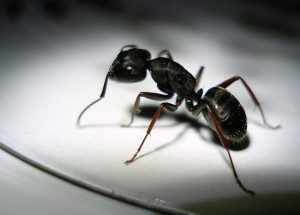 We went into town to do some shopping today. I bought myself a bag of chocolate Minstrels. They used to be my favorite chocolate candy, but my tastes changed and I haven’t had any in about a year, so I wanted to try them again. They weren’t that great. When I was down to the last one in the bag, I didn’t really want it. I decided to toss it into some bushes. An ant would find it, I thought. It would be incredible to him, for us it would be like coming across the Fountain of Youth or winning one of Willy Wonka’s Golden Tickets.
We went into town to do some shopping today. I bought myself a bag of chocolate Minstrels. They used to be my favorite chocolate candy, but my tastes changed and I haven’t had any in about a year, so I wanted to try them again. They weren’t that great. When I was down to the last one in the bag, I didn’t really want it. I decided to toss it into some bushes. An ant would find it, I thought. It would be incredible to him, for us it would be like coming across the Fountain of Youth or winning one of Willy Wonka’s Golden Tickets.
As I walked away, though, I began to think more deeply about it. What would really happen? Seconds after I left, the ant would find the Minstrel, a chocolate 50 times bigger than his own body. He wouldn’t be able to carry it himself, so he’d have to go back for more ants. He’d race back to the anthill, bursting with excitement, pressing his abdomen to the ground to leave a pheromone trail, as you do.
Ants don’t speak, and they certainly don’t speak English, but you don’t speak ant, so this will have to do. The exchange would go something like this: “Guys, you’ll never believe what I found,” he’d say to the other ants, doing their ant work. They wouldn’t even turn around at first. “Guys, didn’t you hear me? I found something great!” A couple of ants would look at each other, and turn around. Even though ants don’t have pupils, and in fact have no muscles to control their eyes, you can still tell that they’re rolling their eyes.
“What did you find this time, George?” one of them asks.
“I found an incredible mountain of chocolate, enough to feed us all for a month!”
The first ant looks at the second and rolls his eyes. Then he looks back. “Sure, George. Sure you did.”
“It’s not like the other times, I promise.” George begins to sweat. Can ants sweat? You tell me; George was sweating. “Just come with me. You’ll see.”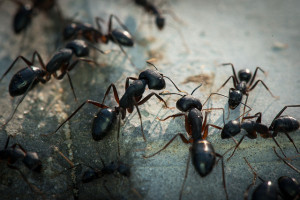 The two other ants gather a few of their friends and follow George. They know he hasn’t found anything, but they’re not too busy, and why miss a chance to laugh at George?
The two other ants gather a few of their friends and follow George. They know he hasn’t found anything, but they’re not too busy, and why miss a chance to laugh at George?
“Slow down, George,” one of them calls to him, as George races back along his pheromone trail.
George doesn’t slow down, though. “Come and see, come and see!”
George gets ahead of the other ants. He wants to get on top of the Minstrel, to be there as the master of it when the other ants arrive. Now they’ll see. Now they’ll like him. They’ll include him in all their ant games.
But the Minstrel isn’t there. He runs from side to side. He can smell where it used to be, or at least he thinks he can. He can hear the other ants coming up behind him. What is he going to do? What can he say? Maybe he’s in the wrong place. He’ll say that. I must have misplaced it, he’ll say. Come back tomorrow, and then I’ll show it to you.
“Where’s it at, George?” a voice comes from behind him. He jumps when he hears it; he didn’t realize they were that close.
“It was… it’s… it was right here.” George’s ant eyes search the eyes of the larger, stronger ant. Ants have external skeletons and internal muscles, so you wouldn’t be able to see that the other one is stronger, but George knows.
“Sure it was, George,” the strong ant says. “Hey guys, look at the mountain of chocolate that George found.”
“Oh yeah,” another of them said. “That looks real good. Let’s go tell the queen. She’ll promote you for sure, George. No more worker ant, no sir. Maybe you’ll be the queen yourself someday after a find like this.”
Ants don’t laugh, but the way they moved their antennae as they went back to the anthill was just as hurtful to George.
He stood near where the Minstrel had been. Had it been there? It was hard for him to know for sure, now. The smell was gone. It had certainly seemed like it was, but there was nothing there now. He looked back in the direction of the anthill. There was nothing there for him either.
George knew where there was a store of tetramethrin. He didn’t know it by that name, of course, and he didn’t know that the anthill was near a large industrial warehouse. He didn’t know what industry was, or what a warehouse was. He knew that the tetramethrin was something the ants avoided though, and he knew why.
Maybe in the tetramethrin, there was something for him.
I rushed back to where I had left the Minstrel, to save George from his fate. It had been less than a minute, but already the Minstrel was gone. That was long enough for George to find the Minstrel and go to tell the other ants, and long enough for some small mammal to come and take it for itself while he was away.
“I’m sorry, George,” I whispered, even though ants can’t understand English.
…If You Can Call This Living
After a week of eating undelicious foods, I can sum it up in one word. I can, but I’m not going to*. Here, have a thousand words instead (there are also four pictures, so make that five thousand words):
We were very surprised to discover how much joy we truly get out of food, and that the joy isn’t even mainly from eating food. We enjoy planning out our menu each week and buying the food. We enjoy making the food. Cooking a delicious meal for others is one of life’s greatest pleasures, perhaps as good as eating the food, and we both felt unsatisfied making food for the other that we knew wouldn’t be enjoyable. Emma runs the Around the World in 196 Recipes blog, which has us trying all kinds of interesting and (usually) delicious foods from around the world, and of course we do the Saturday Sandwich here at Family Against the Flow. Anticipating the delicious food we’ll be eating later in the day brings us pleasure, and at the end of the day we can always look back on the day and think about the wonderful food we’ve eaten. This past week, we’ve had none of the joy in this paragraph at all.
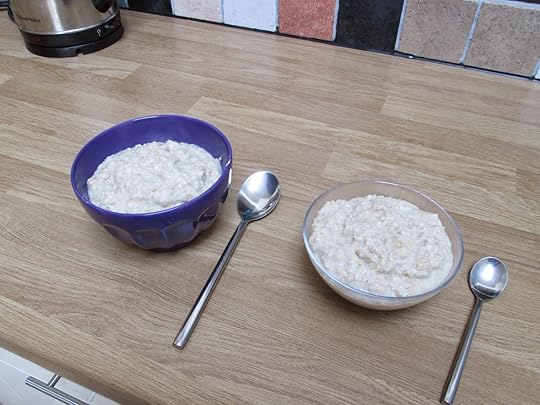
Breakfast. Every day for the rest of your life.
We usually have homemade muesli for breakfast each morning, and we’ve had oatmeal plenty of times with honey and such, and so we figured that oatmeal would be alright, probably one of the easier things. The taste and texture of plain oatmeal was really shocking to us, and eating that for breakfast every day was one of the most difficult parts of this experiment. For Emma it was bitter, and for both of us it was hard to eat. For me, oatmeal was nutty – but not like a nut. Not nearly like anything so delicious as a nut; even a single unsalted peanut would have had more flavor.
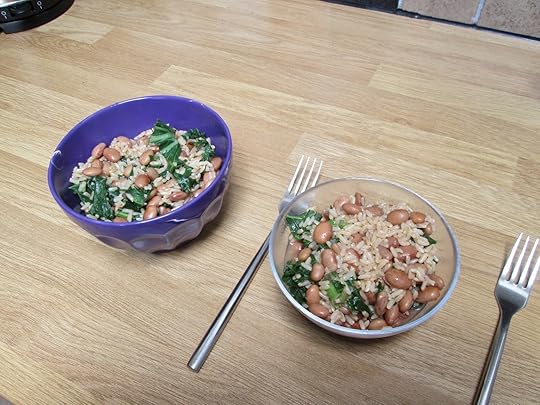
Not as bad as breakfast. But then, nothing could be.
Plain grains in general just aren’t good. They’re all very bland. Vegetables, on the other hand, even the plainest ones we could think of, like leeks, are comparatively an explosion of flavor. Our favorite meal was one of rice, beans, and glorious leeks. I feel like poor countries have a rich heritage of seasoning food for precisely that reason. If you can’t often afford meat or dairy products, you can still likely afford (or grow your own) herbs and spices and make the food you do have, like grains, incredibly delicious. That’s my theory for why countries that are poor or have historically been so (e.g. China, India, Mexico) have such wonderfully spiced and seasoned food. Being relatively wealthier and able to afford a big hunk of ham, you don’t have to use your imagination.
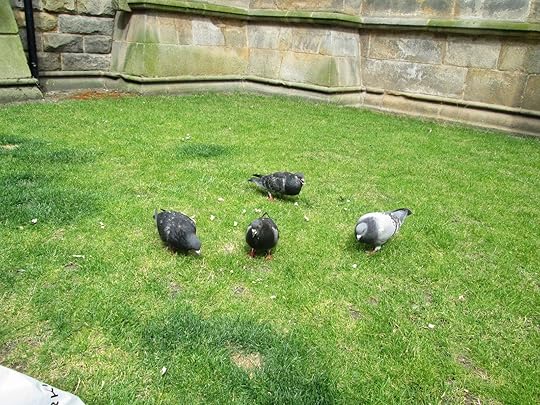
Pigeons frolicking on our bread.
One of the hardest things I’ve ever done in my life was to make a peanut butter sandwich for one of my kids. Normally, I’d give myself a scoop of the peanut butter first. After I was finished, I’d lick the knife clean. Then probably get another scoop. It took nearly more will power than I had just not to eat any of that peanut butter. Another day, we made pizza toast for them, and it was a struggle not to eat any of the cheese as I sprinkled it on, and to not lick the spoon after I spread the tomato puree. It was tough sometimes to make delicious food for them knowing I wouldn’t be having any of it myself. Still, giving joy to someone else was still capable of giving me joy. We even shared some of the bread we weren’t allowed to have with these pigeons, and they seemed to experience plenty of joy.
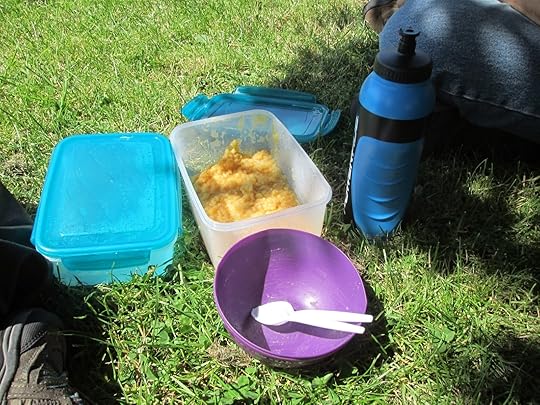
World-class picnic.
Because we weren’t getting the usual joy from meals, we tried different things. For breakfast, we sat in the dining room where it’s sunny, and talked as we ate and for a while afterwards. We felt very lucky to have a sunny dining room, and that’s something we’re going to continue doing. We also ate outside several times, such as the above picture where we’re in the park eating lentils and split peas.
Our digestion doesn’t seem to have been any different even though theoretically we’re getting tons of fibre, since we’re having brown rice, beans, bulgar wheat, quinoa, etc.
We still felt hungry just as often (about every 3 hours) and ate food just as often, although not quite as much food as normal. The food we ate also didn’t give the feeling of satisfaction that we’d normally have. You would feel full, but somehow strangely empty, and definitely unsatisfied.
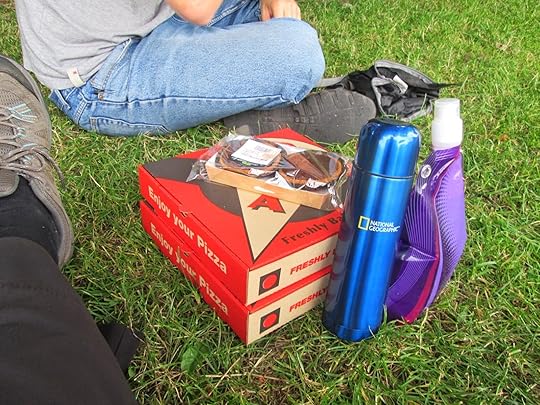
Somewhere near you are two people with only one pizza for each of them. Please, send help.
We intended to go six days eating this way, but after five days we’d learned our lesson well enough. On day six, we had sugar in our oatmeal, salt and pepper in our rice, and then got pizza for dinner.
I feel very grateful that this was a temporary and self-imposed hardship, that we’re not so poor that we can’t afford delicious foods, and that we’re able to get so much joy out of something as simple as food. My heart goes out to anyone on a diet who is denying themselves the joy of delicious foods, or anyone without the money to afford it.
*Alright then, that word is ‘terrible.’
[Crossposted at A Family Against the Flow.]
July 9, 2014
Review: Johnny Got His Gun

Johnny Got His Gun by Dalton Trumbo
My rating: 5 of 5 stars
This book starts slowly, but it really gets going. I put it down only briefly, to sleep, and finished it as soon as I woke up. It amazes me that war can still exist when ideas like those written in this book are freely available for anyone to think. War does exist, though, and I was further amazed when I read the author’s introduction after the main story and read that even he, a man who was one of the Hollywood Ten and lived in exile in Mexico because of his blacklisting for his political views, believed that censorship (even of his own anti-war book, Johnny Got His Gun) during times of war could be a good idea, as long as it was a war he agreed with.
If you’re a fan of the Metallica song One, you might be interested in reading the book it was based on.
View all my reviews



